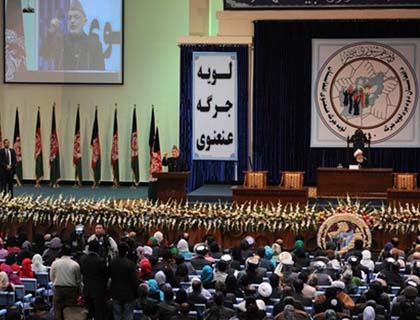KABUL - The four-day Loya Jirga (LJ) on the strategic partnership pact with the US and a mechanism for peace with Afghan rebels on Saturday asked the government to allow US bases in the country for a decade.
In a 76-article resolution, the traditional meeting recommended the conditional creation of US bases in the country. The major event ended with a speech from President Hamid Karzai, who thanked the delegates for offering suggestions on the sensitive issue.
Most of the 40 committees presented their suggestions to the Jirga's general session on the fourth and concluding day of the tribal gathering . Of the 40 committees, 30 outlined their proposals by mid-day.
Addressing the Jirga's inaugural session on Wednesday, President Hamid Karzai said Afghanistan's relationship with the US should be one between two sovereign countries. The president stressed he wanted national sovereignty to be protected at all costs.
He believed the bases were in the interest of Afghanistan and US assistance essential for training Afghan forces. The president once again assuaged neighbors' concerns over the deal and said Afghanistan saw its national interests in having good relations with them.
He asked attendees for proposals on the strategic agreement and a mechanism for peace talks with the rebels. "Afghans know terrorism is not in their villages and houses and the war against it must be fought where it has safe heavens," he said.
Karzai called the Jirga an advisory forum and assured Parliament that the accord would be sent to it for approval after going through the legal process.
Most of the committees insisted all US-run prisons should be shut down, Afghan prisoners handed over to the government and nighttime offensives conducted by Afghan forces
Furthermore, they said the US must help Afghanistan rebuild its infrastructure, train and equip Afghan security forces, prevent neighboring countries' interference and assist local forces to protect borders.
Some groups said their recommendations should be incorporated into the strategic agreement. The second committee said Americans committing any crime in the country be prosecuted based on Afghan laws. The issue of Durand Line also be discussed, the committee said without further elaboration.
The third committee said a timeline for US military bases be set, and the centers established near the border, away far from residential areas.
The fourth committee said Americans should not meddle in Afghanistan's internal affairs, particularly in presidential and parliamentary elections. The 10th group said the US needed to press neighboring countries to stop meddling in Afghanistan.
By and large, the committees termed peace in the country as an urgent need, asking the government to talk to insurgents, especially the Taliban supreme leader, Mullah Mohammad Omar.
However, they said the High Peace Council should be reshuffled and the killers of key national figures, including ex-president Burhanuddin Rabbani, be brought to trial.
The 13th committee suggested names of reintegrees be removed from the black list. The 15th committee said Afghanistan must employ practices of countries such as Saudi Arabia in inking the strategic treaty with the US
Among 41 members of the 18th committee, seven opposed US bases in the country, but other members said Afghanistan should have the right to scrap the pact anytime it wanted.

